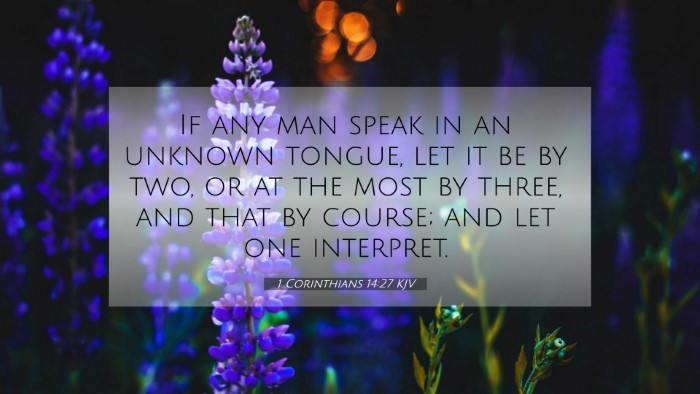Understanding 1 Corinthians 14:27
Verse: "If any man speak in an unknown tongue, let it be by two, or at the most by three, and that by course; and let one interpret."
Summary of Key Concepts
1 Corinthians 14:27 addresses the use of tongues in church gatherings, emphasizing order, clarity, and edification within the congregation.
Meaning and Interpretation
-
Order in Worship:
Matthew Henry emphasizes that Paul advocates for orderly worship in the church. The use of tongues is not to lead to confusion but to enhance the understanding of the message conveyed.
-
The Role of Interpretation:
Albert Barnes notes the necessity of interpretation when tongues are spoken. This ensures that the congregation receives edification and understanding, aligning with the principle that worship should be intelligible.
-
Limitation on Speakers:
Adam Clarke points out the limitation placed on the number of speakers in tongues to maintain decorum and to avoid overwhelming the congregation with too many voices at once.
Contextual Backdrop
This verse is part of a larger discourse on spiritual gifts found in 1 Corinthians 12-14, where Paul seeks to correct misunderstandings regarding the use of tongues and spiritual gifts.
Cross-Referencing Related Scriptures
1 Corinthians 14:27 can be linked to several other Bible verses that shed light on the themes of orderliness, interpretation, and edification:
- 1 Corinthians 12:7: "But the manifestation of the Spirit is given to each one for the profit of all." This emphasizes the purpose of spiritual gifts for communal benefit.
- 1 Corinthians 14:26: "How is it then, brethren? Whenever you come together, each of you has a psalm, has a teaching, has a tongue, has a revelation, has an interpretation. Let all things be done for edification." This verse speaks on the principle that every part of the service should contribute to building up the church.
- Acts 2:4: "And they were all filled with the Holy Spirit and began to speak with other tongues, as the Spirit gave them utterance." This highlights the origin and use of tongues as a gift from the Holy Spirit.
- 1 Thessalonians 5:19-20: "Do not quench the Spirit. Do not despise prophetic utterances." A reminder to respect the gifts of the Spirit, including the gift of tongues.
- Romans 12:4-6: "For as we have many members in one body, but all the members do not have the same function, so we, being many, are one body in Christ, and individually members of one another." This underlines the importance of unity and diversity in spiritual gifts within the church body.
- James 1:5: "If any of you lacks wisdom, let him ask of God, who gives to all liberally and without reproach, and it will be given to him." This introduces the need for divine wisdom when interpreting spiritual gifts like tongues.
- Ephesians 4:12: "For the equipping of the saints for the work of ministry, for the edifying of the body of Christ." This affirms the goal of spiritual norms: edification of the church community.
Thematic Connections
The themes of order, edification, and the role of interpretation in worship resonate throughout Paul's letters and across the New Testament:
- Order in Worship: The importance of maintaining orderly worship is a recurring theme.
- Spiritual Gifts and Edification: Paul regularly addresses how spiritual gifts are to be operated for the benefit of the entire church.
- Community and Unity: Emphasis on unity in diversity is critical as believers exercise their gifts together.
Resources for Cross-Referencing
Those seeking to dive deeper into 1 Corinthians 14:27 and other related verses can utilize various tools:
- Bible Concordance: Helpful for finding related verses by keywords.
- Bible Cross-Reference Guide: Useful for linking themes and verses across the Scriptures.
- Cross Reference Bible Study: A study technique focusing on connections between various verses.
- Bible Reference Resources: Collections of references aiding deeper scriptural understanding.
Conclusion
In conclusion, 1 Corinthians 14:27 serves as an essential guideline for the operation of spiritual gifts, particularly tongues, within the church. By emphasizing order, the necessity of interpretation, and the edification of the church, Paul addresses the practical outworking of the spiritual dynamics at play in corporate worship settings. A robust understanding of this verse can be enriched through cross-referencing other related scriptures, providing a fuller picture of Paul's teaching on spiritual gifts.



